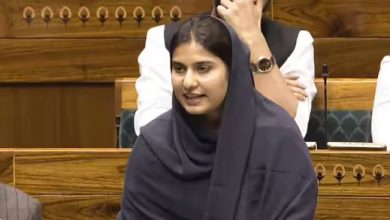Regional tensions pose bigger threat for India than Hindu-Muslim split: Report
South India parties vehemently oppose BJP-led north India's dominance
 Srinagar: As India’s extensive election process nears its end, with the final 164 of 543 constituencies set to vote by June 1, the growing tensions between Indian states pose even greater threat to India’s unity than the growing Hindu Muslim split, writes a New York based media outlet in its fresh report.
Srinagar: As India’s extensive election process nears its end, with the final 164 of 543 constituencies set to vote by June 1, the growing tensions between Indian states pose even greater threat to India’s unity than the growing Hindu Muslim split, writes a New York based media outlet in its fresh report.
As per the report appeared in Bloomberg, the upcoming days of campaigning will highlight these regional divisions. Uttar Pradesh and Bihar, two of India’s largest states, and West Bengal, which has been consistently governed by a party different from that in power at the center, are crucial battlegrounds. The elections in these states are staggered over seven phases to manage their size and to mitigate the risk of political violence, especially in West Bengal, where accusations of external interference and political unrest are rampant.
The Trinamool Congress has leveraged local fears by blaming riots on “outsiders” allegedly brought in by the BJP. The destruction of a statue of Bengali social reformer Ishwar Chandra Vidyasagar in 2019 has been used to paint the BJP as disrespectful of local culture and as importers of violence from northern states.
In southern India, regional parties vehemently oppose the BJP, framing their politics around resistance to perceived northern dominance and threats to federalism. Tamil Nadu Chief Minister M.K. Stalin has warned that the BJP’s continued rule could obliterate state autonomy. Prime Minister Narendra Modi, in turn, has accused southern politicians of disrespecting the north and Hinduism, exacerbating regional animosities.
These regional divides are likely to deepen due to underlying economic and demographic trends. Southern states like Kerala boast human development indices comparable to China or Brazil, while northern states like Uttar Pradesh and Bihar lag behind, closer to sub-Saharan African standards. Economically prosperous states like Tamil Nadu contribute significantly more to federal revenues than they receive, subsidizing the poorer northern states.
Demographic changes will further tilt political power northwards. While West Bengal’s population is expected to remain stable, Uttar Pradesh and Bihar will see significant increases. By 2026, redistricting could enhance the north’s parliamentary representation, raising fears of southern and eastern states being marginalized in New Delhi’s power structure.
Historically, India’s multi-ethnic composition has facilitated robust political competition and alliances across regions. However, with regional tensions escalating, managing these divisions through inclusive growth, enhanced internal migration, or greater state autonomy will be crucial. The current election campaign suggests that these challenges will not be met with the necessary foresight or diplomacy.
The BJP’s aggressive stance towards regional opposition has intensified these conflicts. The federal government’s use of power against local leaders, including the imprisonment of state chief ministers on federal charges, underscores this approach. Meanwhile, regional parties’ promotion of sub-nationalist narratives has led to demands for local job reservations and attacks on non-compliant businesses.
The strength and scope of states’ rights have historically united India’s diverse populace. If federalism becomes a casualty of partisan politics, the nation risks a severe internal crisis, jeopardizing its long-standing democratic framework.








